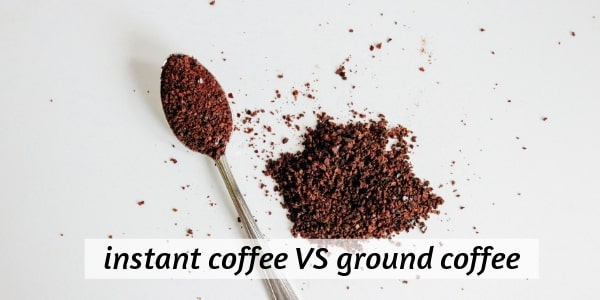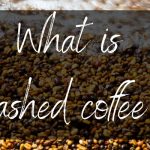When deciding what kind of coffee to get, you're always faced with the decision between instant coffee and ground coffee. In many offices and company buildings you'll find coffee machines with cups of instant coffee.
But why are both types of coffee available ? And more importantly, what are the differences between instant coffee and ground coffee ? Let met explain.

Table of Contents
Ground coffee VS instant coffee
There are several differences between ground and instant coffee, but the most important is that instant coffee has already been brewed and dehydrated.
Ground coffee hasn't been brewed, and is just ground up coffee beans.
Instant coffee is almost always poor quality, while ground coffee can range from poor to excellent.
The various differences are explained in much more detail in this post, but those are the two main points. Now let's talk about thsoe differences in detail.
If you want to make the best coffee at home, you absolutely need to check my article on the best coffee gear.
1. Ground coffee is actual coffee beans, instant coffee is not
Their main difference lies in what they are made of. In essence both instant coffee and ground coffee are coffee, yes. Ground coffee is a bunch of coffee beans that have been ground to a specific size.
What kind of beans are used - more on that here - will decide how good the coffee will be.
This means that after the coffee cherries have been picked and dried and then the beans have been separated from them, they've been roasted to a certain degree.
They're then ground to a specific size, according to what the coffee company requires it to be. But that is where the process stops. The ground coffee is then packaged and sent to the markets.
This is what you will find in the supermarket when you go to buy coffee most of the time.
Instant coffee is again ground coffee, which has already been brewed into actual, drinkable coffee. Only the liquid is then cooled and dried (through various processes) so that only the solids in the coffee are left.
The most common process is to spray the brewed coffee inside a large tower, in which warm air is circulated. This dries the coffee particles, and they gather at the bottom of the tower.
Afterwards they're moistened a bit and tumbled in a drum, so they can clump together to form the granules we all know and recognize as instant coffee.
So in short, instant coffee is made of ground coffee which was already brewed. This has a lot to say in their taste difference. Ground coffee has much more flavor and will give you a broader aroma, with more depth.
Instant coffee is flat, and often very bitter. Once you've had actual coffee brewed from ground coffee instant coffee will seem very weak and flat in comparison.
This has a lot to do with the kind of beans used for both of these coffee types, and also with the brand that manufactures them.
Instant coffee can be found in many homes, does to commodity and price since it's always cheaper than ground coffee, or at least on the same mark as the cheapest ground coffee.
Instant coffee has its own advantages, but there are some definite tradeoffs.
2. Instant coffee dissolves in liquids
Instant coffee, being actual brewed coffee, will dissolve into the water or liquid you want to dissolve it. This also means that you have to be very careful with how much water you add to your instant coffee.
It's best to add a little less than what the instructions on packaging say, since instant coffee tends to be very flat in taste and too much water can make it worse.
Often you'll find instant coffee as a mix of coffee with powdered milk, sugar, and added flavors. This makes it a very convenient drink for extremely busy people, or in places where the coffee can't really brew well, like on the International Space Station.
Still, very few people ever go on that station, so the effort of getting a cup of real coffee wouldn't be too much for regular people.
As for ground coffee, it will not dissolve into your water no matter what you do to it. Even if you were to blend it into oblivion and make a sort of odd smoothie, it would not be dissolved but cut into a very fine powder.
If you were to let that mixture sit for a few minutes you'd notice the powdered coffee sink to the bottom of your cup.
This is because the coffee grounds are made of a large amount of fibers, which do not dissolve in water. Much like trying to dissolve cinnamon in you coffee, or cocoa powder. They will not disappear into your drink but simply sink to the bottom.
So in a way, you could say that instant coffee is better when it comes to coffee by-products and cleaning the utensils. Still, there are uses for your used coffee grounds.
Also keep in mind that the frappe was invented in Greece at an instant coffee convention, so there is a place for instant coffee in some drinks, especially the cold or iced ones.
(If you like this article so far, you can pin it to your Pinterest board by clicking the image below. The article continues after the image.)
3. Ground coffee has a higher caffeine content
Ground coffee often has a higher caffeine content than instant coffee, and this has to do with two very important things that happen when brewing coffee.
The way caffeine works is that is needs to be extracted from your actual coffee bean or ground. This happens when the bean is exposed to heat, and a liquid to draw it out.
So this means that hot water in contact with your coffee will literally absorb the caffeine in the bean. The longer the coffee stays in the water, the more caffeine gets extracted.
This is why coffee makes like the French press, the phin, the Turkish ibric, even the humble drip filter, are all going to produce a very strong coffee brew in terms of caffeine and even taste.
Ground coffee will give you an easily adjustable coffee brew and you can always tweak it as you wish.
With instant coffee you have no control over this. The amount of caffeine extracted relies solely upon the coffee company manufacturing your instant coffee. Often they'll strive to make as strong a coffee powder as they can, but you'll see this has its drawbacks in a bit.
So you're limited to the amount of caffeine the coffee company managed to extract in their coffee before drying it. This can be worked around if you simply add more instant coffee to your water, but that often results in an even more bitter drink.
Which would then need more milk or sugar to be palatable. Which will not help you health at all.
4. Instant coffee is often poor quality, and cheaper
This is always a problem for coffee drinkers, but the advantages sometimes outweigh the lack of quality. The main reason ground coffee is so bad is that it's almost always made with Robusta beans.
Robusta is a cheaper coffee bean, but it has a much higher caffeine content than Arabica. Arabica is what most ground coffee is made out of, sometimes blended with a bit of Robusta to a stronger kick or more caffeine.
If you want a comparison, Robusta actually has double the caffeine of Arabica, but it also has half the amount of sugars and fats that Arabica comes with.
This translates into an earthy, bitter coffee with a much stronger kick than Arabica. This is the kind of coffee many people have a problem drinking black, and is often mixed with sugar and cream to be easier to drink.
It's also why Robusta is often used in heavily mixed coffee drinks (like a cappuccino or a latte).
So there's that, instant coffee is often of poor quality because it uses Robusta beans. They're cheap, and they're the best way to bring a high caffeine content to the table.
But this is the very thing that makes instant coffee taste so bad, since instant Robusta is worse than brewed Robusta.
Here the way instant coffee is manufactured doesn't help at all. This is because subjecting the already brewed coffee to additional drying and cooling will severely impact the final taste.
It will strip away flavor and only leave bitterness, but yes the caffeine will be there. You can always try and help things out with the additional flavorings like sugar, powdered milk, vanilla or whatever else is found in many instant coffee packets.
If you'd like to know how to really flavor your coffee, you should read this article on the basics.
But it's much like putting lipstick on a pig. I know there might be instant coffee lovers out there who are very angry at me right now, but I've never been okay with instant coffee.
5. Instant coffee is almost always Robusta
This is another thing to consider when deciding between instant or ground coffee. As discussed above, Robusta is often the kind of coffee bean used for instant coffee.
It brings a lot of caffeine to the drink, and it has a strong enough flavor. But there are a few other reasons for this, and they're pretty good and logical ones.
One of the reasons is that Robusta has such a strong flavor and can stand up to large quantities of milk and sugar and other added flavors.
So for example in drinks like a latte, or iced latte, or triple moccacino with two shots of vanilla (or some other silly variant) you will need to use a bold coffee flavor.
When it comes to coffee production, Robusta seems to be queen. This is because when the coffee cherries grow, Robusta yields double the amount as Arabica.
This means it's always going to be cheaper to use Robusta beans, since there's so many of them.
Another reason is that Robusta also is highly resistant to diseases and pests (thus easy and cheap to grow), which is what brought down Arabica production so many years ago and the coffee company had to improvise.
There is also the fact that lots of coffee is lost while making instant coffee, and using cheap beans will significantly cut down the cost of making instant coffee.
This is the same reason decaf coffee is made out of Robusta beans and not Arabica (usually), since the process is very expensive and corners often need to be cut.
Robusta seems to be the duct tape of the coffee industry.
6. The brewing time is much longer for ground coffee
Finally, we come to just how convenient instant is. When making ground coffee you have to wait around for it for a few minutes, clean the machine and throw away the coffee grounds, and then you can enjoy your drink.
For some this process is too cumbersome and takes too long, so instant coffee stepped in to produce, uh, instant coffee. Just add hot water and you're done. You don't even need hot water.
So for example if you're out in the woods (camping for example) and need a cup of coffee, you can always whip out an instant coffee packet, mix it into your water bottle and you're done.
However I've been on camping trips where people have bothered to bring a coffee pot with them to make fresh coffee over the fire. So I guess it's up to each person if they find instant coffee convenient or not.
Much like with teabags and loose leaf teas, which are often debated as hotly as instant coffee and ground coffee.
Final thoughts
I hope I wasn't too biased in my description of instant coffee in this article. I for one don't really like this kind of coffee, but I know it's a saving grace for other people, and I can understand that.
It's just the taste I have a problem with, since I'm more of a flavor gal and I'm very picky about food and drink.
But if you've never had instant coffee, I suggest you go out and get yourself a small packet and try it out. You might like it, you might not. But at least you'd have first hand experience with it and can judge the taste on your own.
If you want to know more about coffee or tea, feel free to check the related articles below. Who knows what else you might find ?





